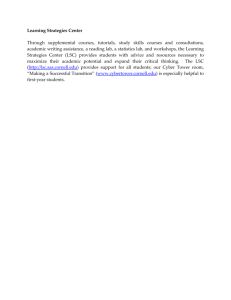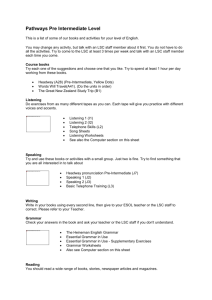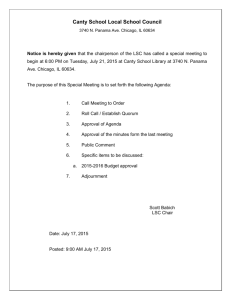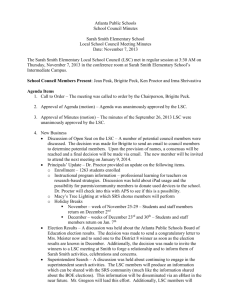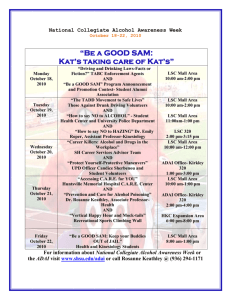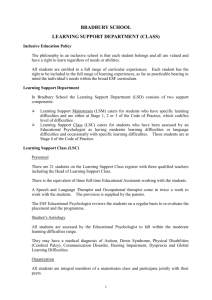lsc leadership workshop
advertisement
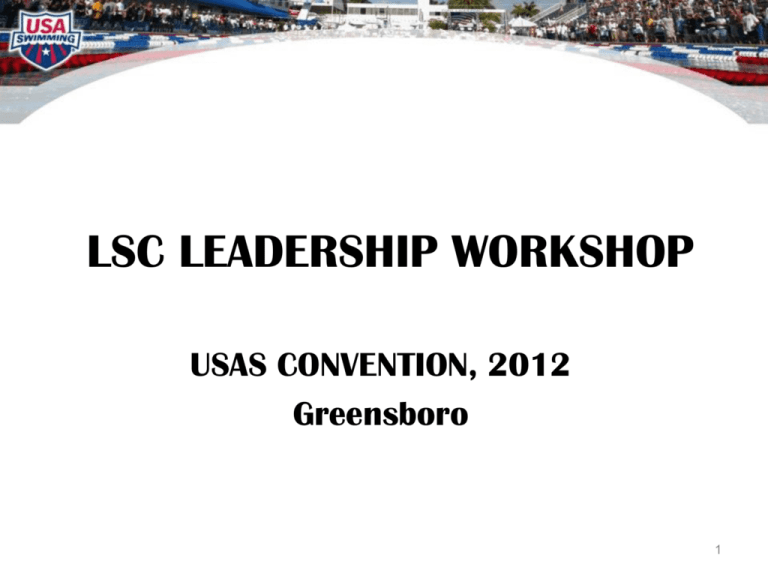
LSC LEADERSHIP WORKSHOP USAS CONVENTION, 2012 Greensboro 1 Nonprofit Governance Materials Used with Permission of BoardSource www.boardsource.org Why is it always me? 2% “Leaders” 5-10% “Doers” 15-20% “Do Somethingers” 68-88% “Belongers” Getting them “on board”? The Key Questions • Ask yourself: – Do we have a clear mission? – How does our board spend its time? – What is my motive for being involved at the board level? – What is our vision for the future? – Are we prepared for our future challenges? – Is our board fulfilling its responsibilities? 4 “Where do I find stuff for LSC’s?” “Measuring Effectiveness” Developed and Administered by the LSC Development Committee LEAP: The Carrot • Level 2 (7 LSCs) – 0.50 per registered year-round athlete – Minimum $1,000 – Maximum $2,500 • Level 3 (1 LSC) – 1.00 per registered athlete – Minimum $2,000 – Maximum $5,000 LEAP: The Stick • Level 1 is required once per quad**** • Non compliant LSCs: – Multiple opportunities for help – Eventually, reported to the Board of Directors for appropriate action ****Currently reviewing results The Goal = More Effective Boards and LSC’s….. Dysfunctional: not even doing what’s required Functional: in compliance LEVEL 1 Responsible: More than required; planning for the future LEVEL 2 Exceptional: Innovative, creative, leading the pack in service to members LEVEL 3 More swimmers….. Faster swimmers….. The Frank Sinatra Model “I did it my way” The Otis Redding Model “Sittin’ on the Dock of the Bay…watching the tide roll away…” The Katy Perry Model “You're hot then you're cold…You're yes then you're no” The Bette Midler Model “Did you ever know that you're my hero? You're everything I wish I could be.” Nonprofit Board Responsibilities Four Major Categories I. Trusteeship II. Planning for the Future III. Policy-Setting IV. Financial I. Trusteeship Includes A.Vision and Mission B.Legal and Ethical Integrity C.Enhancing Public Standing D.Governance of the Board A. What is a Vision Statement? 10 years from now, we will ……………….. A. Mission Statement • Why do we exist? • What is our business? • What do we do? Mission Statement: (“all rise”) • You have a basic idea what your LSC mission statement says • Your mission statement is publically posted Your mission statement has been reviewed since it was written • You can recite some of your mission statement • You can state your mission statement word for word If you don’t know where you’re going, it doesn’t matter how you get there! • Doesn’t USA Swimming already have one? • Make it YOURS 21 The Mission Statement • Indicates focus and purpose • Reference point for: – Planning – Board and staff decision-making – Allocating resources – LSC assessment • Suggested is 17 words or less 22 Creating a Mission Statement • A retreat of interested people • Time to reflect: SWOT • Not in conflict with USA-S handout 23 B. Ensure Legal and Ethical Integrity • Governance means…………. • Board is authorized to act and govern • Board is accountable to the members – Accountable to USAS under 501c3 umbrella • Protect and pass on the assets • Expectation of accountability and openness 24 Legal Duties • Duty of Care • Duty of Loyalty • Duty of Obedience • Duty of Transparency handout 25 Board Structures-Bylaws Bylaws determine: • the organization structure • the rights of the membership • procedures 26 Your LSC Bylaws • Template • Update ANNUALLY following changes made at USAS 27 C. Enhance Public Standing • Articulate the mission and goals • Communicate your accomplishments • Garner public support Do you articulate your mission and goals? Do you communicate your accomplishments? Do you Garner Public Support? Communication with our Membership: (“all rise”) • Our website is updated frequently • We send blast emails • Someone answers the phone during business hours • At least 75% of teams attend HOD meetings • We use social networking Communication Effectiveness Most Effective Two Way One on One Small Group One Way Speech Handwritten note Letter Personal/Business Large Group Newsletter Telephone Blast e-mail Website E-Mail Least Effective Source: BoardSource, Sandy Hughes Your Website • Who you are and what you do? • Only well-informed “swimming people”? • Professional, clear and accurate – Promotes transparency – Central library for information Can a novice parent find the information she needs? D. Governance of the Board • • • • • Build a Competent Board Engage volunteers Run engaging meetings Operate legally and ethically Evaluate board and LSC performance Do you have? (“all rise”) • Clear roles and responsibilities • Up to date Policies and Procedures Manual • Written job descriptions • Functioning committees • A written crisis management plan • A written strategic plan Board Building • Identify board needs • Cultivate potential board members • Recruit prospects • Orient new board members • Activate all board members • Educate the board • Rotate board members • Evaluate the board and individual members • Celebrate successes! 41 Your Current Board • How old is your board? – Average age – Term limits not enforced – Playing musical chairs • How diverse is your board? – – – – – Age gender ethnicity interest occupation Board Recruitment • Two skills on every board – Attorney – CPA • Also consider – PR and Marketing – Technology – Entrepreneur Who do we have? Who do we need? 43 Board Recruitment • Job descriptions and manuals – Written – BOD member manual – BOD policy manual • Honesty in recruitment Oh, it won’t take much of your time……….. 44 The Role of the General Chair • • • • • Build participation Communicate Delegate Be visible Develop future leaders General Chair 46 The Chair at Board Meetings • Focus the Board on important issues – Set the tone – Design the agenda Individual Board Members • The 4 Duties • Relationship with the Staff • Conflict of Interest 48 Board Members at Meetings • • • • • • Be present Board Member Do homework Wear your Board Hat Sit at the table Stay on the subject Act on your responsibilities after the meeting Committees • Permanent – – – – – – – Executive Finance Nominating Age Group Senior Officials Diversity and Inclusion • Task Force – Specific Assignment – Short Term Bring in “new blood” 50 Board Dynamics • Meeting Preparation • Read the Mission Statement • The Agenda – Prepare and send in advance – Prioritize – Relate to goals of the LSC – Use consent agenda for package approval Allow sufficient time for thinking and debate (prioritized consent agenda) handout 51 Stimulate thinking and debate…. get the party started! • • • • • • • Silent Starts One Minute Memos Counterpoints 5 Finger Consensus Surveys Index cards Around the table-what do you think? handout 52 Conflicts • Wearing the “Board Hat” – Duality of Interest – Recuse self as necessary 53 Removal from the Board • • • • In by-laws Non attendance conflict of interest Process • Term limits • Intervention • Vote Strongly Recommended Board Policies • Conflict of Interest Policy – Not always illegal and may be unavoidable – Recuse self from discussion and voting – Written policy signed annually • Whistleblower Policy • Document Destruction Policy Handout (3) 55 Crisis Management • Before the crisis: –A written plan –Who speaks for your board? –Prepare for worst case scenario handout II. Planning for the Future A. Evaluate B. Participate in overall planning process A. Evaluate • The standards are: – the mission statement – the strategic plan – stated goals 58 Board Self-Evaluation A. Does Well LSC’s Mission Relationship with Permanent Office Staff Program Evaluation Fund Raising Financial Oversight Strategic Thinking & Planning Selection & Orientation of BOD Public Relations & Advocacy Board Operations Board Liability & Risk Management handout B. Needs Work C. Not Applicable Key questions for LSC Assessment • If we were starting over, what would we change? • Are our program priorities consistent with our mission statement? • Of the various LSCs like ours, which are the best? • What is likely to change over the next 3-5 years? 60 B. Planning • Strategic Planning Sessions – Set aside a weekend – Bring in a facilitator • Arlene McDonald! – Evaluate, plan – Action Steps handout Managing Change • Tips – Shared vision – Baby steps – Take your time!! – DO SOMETHING III. Policy Setting A. Determine, monitor and strengthen programs B. Create, enforce, evaluate policies C. Hire and mentor CEO Clear policies guide and protect the organization •Fiscal •Compensation •Governance A. Monitor and Strengthen Programs and Services • • • • Determine which programs are consistent with mission and strategic plan Monitor effectiveness Eliminate when necessary Fund appropriately Program Evaluation • • • • • • Meet schedule and policies Athlete performance nationally Education (Camps, Swimposiums) # of Officials Membership Growth and Retention Communication Tools B. Board Policies • • • • • Policies Support Programs Establish Objectives Formulate Statements Implement Evaluate Written policies in an up to date policy manual!! 68 What Goes in a Policy Manual • No conflict with by-laws, USAS rules • In detail: – Registration information: transfers, Outreach – Financial procedures – Travel reimbursement – Meet scheduling, hosting and administration – Zone Team handout Rules and Regs vs Policy Manual Rules and Regulations • Admin of Competitive Program • Swim Meets • Age Group Competition • Senior Competition • Championships • Special Teams and Events Policies and Procedures • Financial and Fiduciary • Membership • Office and Staff • Functioning of the Board • Volunteer and coach • Safe Sport • Wet Side Policies • Dry Side Policies C. Hire and Mentor the CEO • To carry out policy • To oversee programming LSC Models • LSC Models – All volunteers – Permanent office (paid) staff + volunteers – Paid Executive Director+ staff + volunteers Common Issues • • • • • • High stress and frustration of Board Members Can’t satisfy day-to-day demands and implement strategic plans Implementation of new initiatives is difficult. Work is informal and spotty. Management worsens with growth Difficult to find talented “new blood” In the absence of a Chief Executive……… • • • • Who is delegating? Who is keeping track? What is the chain of command? Ultimate responsibility? General Chair Job Description • The General Chair shall: – oversee and have general charge of the management, business, operations, affairs and property of the LSC, and general supervision over its officers and agents; – shall call meetings when and where deemed necessary; – shall preside at all meetings; – shall appoint committee chairmen and members for standing and special committees or coordinators as may be necessary to permit the LSC to effectively, efficiently and economically conduct its affairs. Handout (2) The “Permanent Office” Staff • • • • Leads and manages Communicates Educates The “face” of the LSC – The person who deals with the public 76 Questions for the Future 1. 2. 3. 4. 5. Can volunteers do it all? How big is too big? How small is too small? Can we bundle services? Are new volunteers “stepping up?” Why or why not? IV. Finances A. Ensure adequate resources B. Budget C. Manage assets effectively A. Ensure Adequate Resources • Where does your $$$$ come from? – Registrations – Surcharges – Splash fees – Donations – Sponsorships To increase income we ______________ B. Budget • How much do we need to reach our goals? • Are we budgeting to achieve our mission? 80 Budgeting According to Mission: Examples • Mission says “education”……. – Does budget reflect education? • Mission says “excellence”…….. – Does budget reflect a commitment to excellence? • Mission says “support to highest levels”……. – Does a 10 year old going to Zones get more $$ than a swimmer going to Olympic Trials? Hard Money Budget • Items you can’t afford to be without • Covered by basic fees and guaranteed income • Examples: • Basic Administrative/staff costs • Registration • Basic Zone expenses 82 Program Enrichment Budget • Plan and dream • Immediate & long term needs • Sources • Surcharges • Sponsorships • Surplus 83 Examples of Program Enrichment •LSC Training Camp •Travel to Dual Meet with another LSC •Coach education and clinics •Scholarships for disadvantaged swimmers C. Manage Assets Effectively Fiduciary Responsibility Includes: • • • • Financial Basics Monitoring Adequate Controls Overseeing Legal Obligations Nonprofit is a tax status, not a business plan. 85 Financial Oversight • Reporting • Financial Policies • USA Swimming sample documents Handout (2) 86 Financial Policies Reserves • Used to: – Manage cash flow interruptions – Meet commitments and obligations – Generate investment income • Liquid assets: quickly converted to cash • Written policy for use • USAS Board Policy: 6 months of program funding and operating costs Audits Internal Audit • Done by individuals associated with organization • Studies internal controls and procedures • Issues report External Audit • Done by independent CPA • Tests controls and risk factors • Attests to whether financial statements are GAAP* compliant *Generally Accepted Accounting Principles Conclusions: Hallmarks of an Effective Board 1. Clear roles & responsibilities 2. Focus time & attention on important things 3. Engages in evaluation & planning 4. Has confidence to take risks 5. Open, honest communication 6. Works together as a unit 91 Going Forward: A. To provide a challenging, competent environment for our swimmers we will: ________________________________ B. One thing we do really well is: ________________________________ C. Our biggest issue or challenge is: _________________________________ Need Help? Arlene McDonald: LSC Governance Consultant arlenemcd@aol.com Sue Anderson: Programs and Services Director sanderson@usaswimming.org 93
